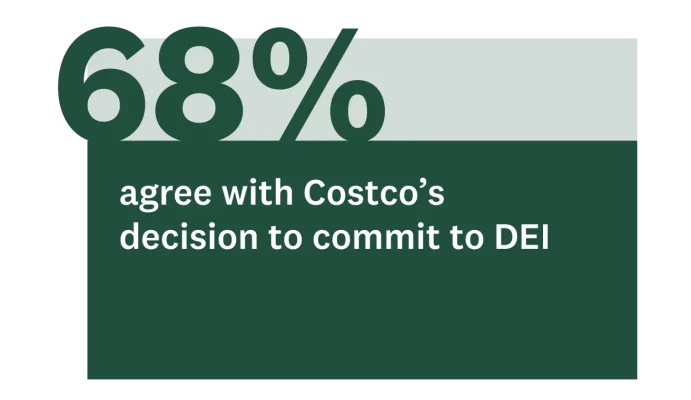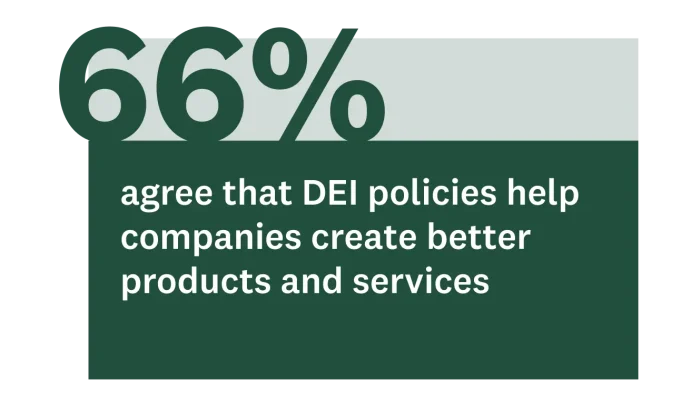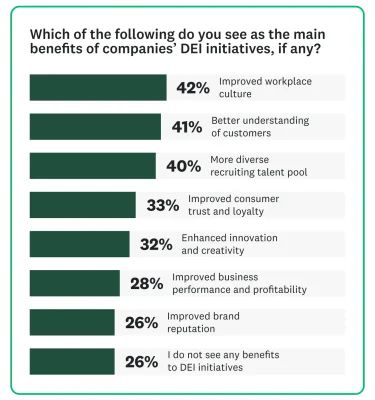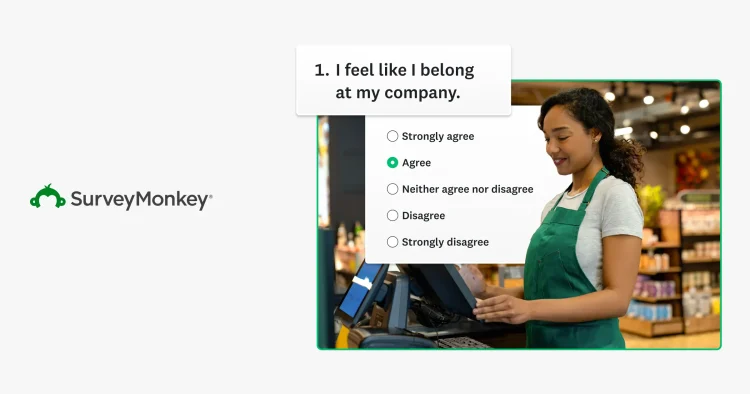Since 2023, corporate giants like Meta, Walmart, and Amazon have scaled back on diversity, equity, and inclusion (DEI) initiatives. On the other hand, Costco is making headlines for reaffirming its commitment to DEI.
This contrast got us thinking: How do Americans really feel about corporations rolling back DEI programs? Does a company's stance on DEI influence its ability to attract talent or maintain consumer loyalty?
We surveyed 7,877 U.S. adults to uncover their feelings about the Costco DEI policy and the anti-DEI movement. Keep reading to explore 25+ stats and 10 tips to help businesses foster more inclusive and diverse workplaces.
25+ stats: How Americans really feel about Costco, DEI, and the anti-DEI movement
Diversity initiatives remain a hot-button issue as the federal government reevaluates its stance on DEI. Following recent actions by President Donald Trump to place federal DEI workers on leave, the national conversation has intensified, with businesses, policymakers, and the public weighing in on the role of diversity, equity, and inclusion.
Amid this broader cultural debate, Costco shareholders recently fended off a challenge to its current diversity, equity, and inclusion initiatives.
What do Americans really think about DEI and Costco’s stance on diversity initiatives? Here’s what we found.
68% agree with Costco’s decision to reaffirm its commitment to diversity, equity, and inclusion

Costco's board advised shareholders to reject a proposal from the conservative think tank, the National Center for Public Policy Research, that questioned the effectiveness of the company's DEI measures.
At 68%, most Americans backed the wholesale retailer’s decision to continue with its commitments. Women, younger consumers, and people of color show more substantial support for Costco’s diversity efforts:
- 74% of women support Costco’s DEI stance, compared to 63% of men.
- 76% of Gen Z and 74% of Millennials back Costco’s decision, compared to 66% of Gen Xers and 60% of Boomers.
- 75% of Asian/Pacific Islander and Hispanic Americans, and 78% of Black Americans, support Costco’s DEI stance, compared to 65% of white Americans.
Over 1 in 3 people are more likely to apply to companies that implement DEI practices
One in three Americans (35%) say they are more likely to apply to work at companies with inclusivity initiatives:
- Women (40%) are more likely than men (30%) to be drawn to workplaces with DEI policies.
- 47% of Asian/Pacific Islander Americans say DEI efforts increase their likelihood of applying, followed by 44% of Black Americans, 39% of Hispanic Americans, and 32% of white Americans.
66% agree DEI policies lead to companies building better products and services

The majority of Americans, 66%, believe that DEI practices lead to better products and services from companies:
- 73% of women think DEI programs positively impact product quality, compared to 59% of men.
- Nearly three in four Gen Z (74%) and Millennials (71%) believe in DEI’s positive impact on products, compared with 64% of Gen Xers and 57% of Boomers.
- Black Americans (78%) are most likely to believe that DEI leads to better products and services, compared with Hispanics (73%), Asian or Pacific Islander Americans (71%), and 62% of white Americans.
39% of consumers say they’d be less likely to shop at companies that cut DEI policies
- Two in five Americans say they are less likely to patronize businesses that roll back or cut their DEI policies.
- 36% say such decisions have no impact.
- 22% say they are more likely to frequent businesses that remove DEI programs.
Americans cite “improved workplace culture” as the biggest benefit of DEI programs

Most Americans (71%) say DEI has a positive impact on companies. Additionally, other benefits include:
- Improved workplace culture (40%).
- Better understanding of customers (41%).
- A more diverse talent pool (40%).
However, 26% of Americans believe DEI has no significant benefits for companies. Generational perspectives also play a role. Gen Z (36%) and Millennials (30%) are the most likely to view DEI policies as essential for improving brand reputation, compared to just 21% of Gen Xers.
What brands support DEI?
Despite growing pushback and unlawful proposals to roll back diversity initiatives, several major brands continue to stand by their DEI programs. Companies across industries—from tech to finance to retail—recognize the value of fostering inclusive workplaces and supporting marginalized groups.
Here are some brands that remain committed to DEI as of February 2025:
- Apple: Continues investing in diversity initiatives and workplace equity.
- Ben & Jerry’s: Longtime advocate for social justice and inclusion.
- JPMorgan Chase: Focuses on expanding opportunities for underrepresented communities.
As legal challenges and attorney general investigations into DEI programs unfold, these brands remain firm in their commitment to respect and inclusion in the workplace.
10 strategies for creating an inclusive workplace (+ 5 free DEI survey templates)
A strong DEI strategy isn’t just about policies—it’s about continuous improvement. Research shows that companies with diverse leadership teams are 36% more likely to outperform their peers and benefit more financially.
Yet, many organizations struggle with maintaining long-term inclusivity initiatives, especially as priorities shift. But as Antoine Andrews, chief diversity and social impact officer at SurveyMonkey, puts it:
- “Diversity, equity, and inclusion challenges are constantly evolving and can’t be ‘solved’ on an annual, calendarized basis. That’s why strategy is so important. A comprehensive, multi-year DEI and Social Impact strategy—driven by ongoing feedback—provides the flexibility and structure needed to adapt as you go.”
With this in mind, here are 10 actionable strategies to foster inclusivity in your workplace.
- Foster a culture of belonging: Creating spaces where people feel safe sharing their perspectives in meetings, at workplace events, and when key decisions are being made. Build a workplace environment your employees will love with our Culture Pulse Survey Template.
- Implement inclusive hiring practices: Foster structured interview processes, inclusive job descriptions, and objective evaluation criteria. Build diverse hiring panels to ensure multiple perspectives in candidate selection.
- Provide DEI training: Train employees on bias and inclusivity through interactive workshops, real-world case studies, and ongoing learning opportunities. See 30+ training survey questions.
- Create employee resource groups (ERGs): Establish ERGs to amplify underrepresented voices, foster community, and provide a platform for advocacy and professional growth.
- Build equitable opportunities: Develop clear pathways for career advancement and leadership, ensuring all employees have access to mentorship, training, and upward mobility. Use the Professional Development Survey Template to uncover areas for team skill development on your team.
- Regularly assess workplace policies: Conduct ongoing reviews of policies and practices to identify and eliminate barriers to inclusion.
- Encourage inclusive decision-making: Make sure a variety of perspectives are considered by involving diverse teams in key discussions. Ensure you're creating a workplace where everyone feels valued with our Belonging and Inclusion Survey Template.
- Offer flexible workplace environments: Provide adaptable work arrangements, such as remote options and flexible hours, to accommodate diverse needs and promote work-life balance. Support your remote team better with the Remote Work Check-In Survey Template.
- Address discrimination and bias: Build clear policies and reporting processes to prevent and address bias.
- Celebrate cultural awareness: Host events, initiatives, and educational programs recognizing various cultural months, holidays, traditions, and historical events. Strengthen your workplace environment with our Organizational Culture Survey Template.
Foster a more inclusive workplace with SurveyMonkey
By staying committed to DEI, Costco is setting a powerful example for other organizations to embrace diversity, equity, and inclusion as a critical part of their organization.
If you're looking to start or refine your organization's DEI journey, SurveyMonkey offers the tools you need to measure, track, and improve your efforts.
Discover how SurveyMonkey can help with your DEI initiatives
Methodology: This SurveyMonkey study was conducted January 22, 2025 to January 26, 2025 among a sample of 7,877 adults in the US. Respondents for this survey were selected from a non-probability online panel. The modeled error estimate for this survey is plus or minus 1.5 percentage points. Data have been weighted for age, race, sex, education, and geography using the Census Bureau’s American Community Survey to reflect the overall demographic composition of the United States.



